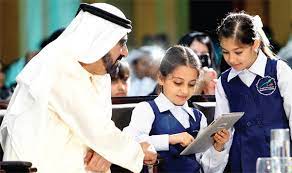Emirati Children’s Day is celebrated annually in the United Arab Emirates (UAE) on March 15. The legislation, widely known as Wadeema’s Law, came into effect in 2016 and has lived up to its name since. It outlines the legal rights of minors and safeguards all children below the age of 18 from all sorts of abuse, ranging from physical to verbal and psychological. Similarly, the country’s leaders have long worked towards the empowerment of children, the protection of their rights and the exploitation faced by them at home and school. Echoing the sentiments, Maya Al Hawary, chairwoman of the board of governors at Dubai Carmel School, lauded the positive impact of the law, reported The National UAE.
For the unversed, the law was passed following the tragic demise of eight-year-old Emirati girl Wadeema, who was buried in the Sharjah desert in 2012 after being tortured by her father and another adult. Speaking about Wadeema’s Law, Hawary said, “Since that policy came out, we have used it extensively. We had several instances where pupils came from their homes beaten and abused. Before the law we could not do anything about it, because who would we talk to?”
Hawary added, “We would try to bring in the family but the children would beg us not to, as they were afraid. Since the law came out, children have been able to have a voice.” In November 2019, the Ministry of Education also kicked off a Child Protection Unit, bringing specialists onboard, who are allowed to intervene in cases involving children who are victims of abuse. Singing praises for the organisation, Hawary mentioned, “The Child Protection Unit are an amazing authority. They follow up and it can come to a point where they can take the child away from the parents.”
Moreover, students are educated about the child protection policy at school. “They have a voice and they feel heard; they can take charge of their life,” she said, adding, “Parents also now know that their children or the school can scrutinise them and they have to take responsibility. The child protection policy is not only about abuse, but about mistreating children, and not allowing them to have normality in their lives. A lack of sleep is abuse to the child as well.” Hawary noted that several students come to school with marks of physical abuse on their bodies, while others fall asleep during classes, implying several parental neglect at home. “The reason could be a very active nightlife or drug abuse,” she stated. “Now, these instances of child abuse have become more uncommon but you still have these once or twice a year. I am hoping children know what to do and it is part of school education to raise awareness of their rights,” Hawary concluded.
…
